University Report: Analyzing Communication Skill Importance
VerifiedAdded on 2020/03/16
|11
|3308
|511
Report
AI Summary
This report delves into the importance of communication skills, utilizing various self-assessment tools to analyze the author's strengths and weaknesses. The author employed the Talkaholic scale, the Personal Report of Intercultural Communication Apprehension (PRICA), the Self-Perceived Communication Competence Scale (SPCC), the Personal Report of Public Speaking Anxiety (PRPSA), and the Willingness to Listen Diagnostic tool to evaluate their communication proficiency. The analysis revealed a talkative nature, a need for improvement in intercultural communication, strong self-perceived competence, confidence in public speaking, and poor listening skills. The report identifies specific instances where communication challenges arose, including impatience in listening and biases in intercultural interactions. It then reviews literature on effective communication, emphasizing the importance of active listening, intercultural sensitivity, and appropriate body language. The report concludes by highlighting the need for patience, attentiveness, and cultural awareness to foster improved communication in professional settings, drawing on research to support the recommended strategies for enhancing communication skills in the workplace.
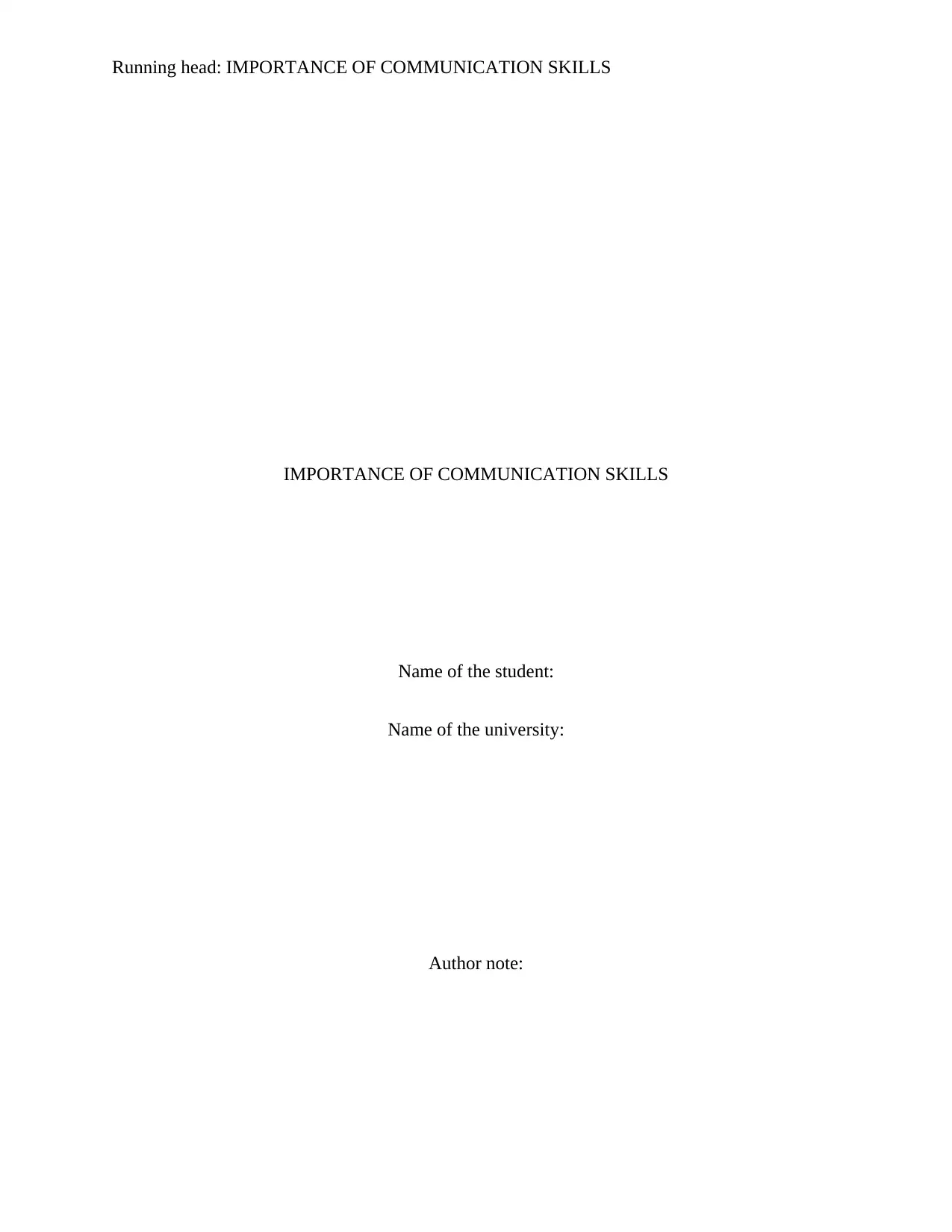
Running head: IMPORTANCE OF COMMUNICATION SKILLS
IMPORTANCE OF COMMUNICATION SKILLS
Name of the student:
Name of the university:
Author note:
IMPORTANCE OF COMMUNICATION SKILLS
Name of the student:
Name of the university:
Author note:
Paraphrase This Document
Need a fresh take? Get an instant paraphrase of this document with our AI Paraphraser
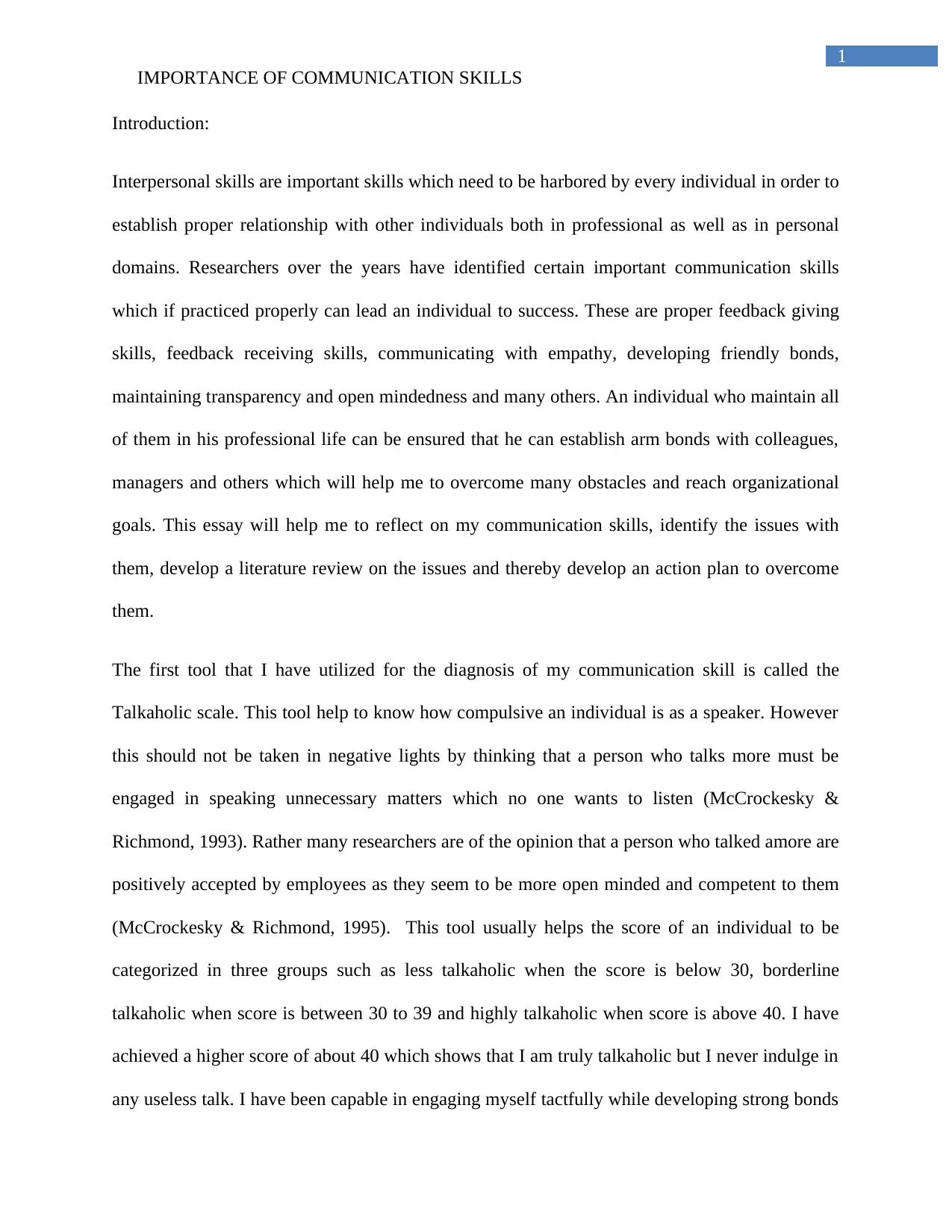
1
IMPORTANCE OF COMMUNICATION SKILLS
Introduction:
Interpersonal skills are important skills which need to be harbored by every individual in order to
establish proper relationship with other individuals both in professional as well as in personal
domains. Researchers over the years have identified certain important communication skills
which if practiced properly can lead an individual to success. These are proper feedback giving
skills, feedback receiving skills, communicating with empathy, developing friendly bonds,
maintaining transparency and open mindedness and many others. An individual who maintain all
of them in his professional life can be ensured that he can establish arm bonds with colleagues,
managers and others which will help me to overcome many obstacles and reach organizational
goals. This essay will help me to reflect on my communication skills, identify the issues with
them, develop a literature review on the issues and thereby develop an action plan to overcome
them.
The first tool that I have utilized for the diagnosis of my communication skill is called the
Talkaholic scale. This tool help to know how compulsive an individual is as a speaker. However
this should not be taken in negative lights by thinking that a person who talks more must be
engaged in speaking unnecessary matters which no one wants to listen (McCrockesky &
Richmond, 1993). Rather many researchers are of the opinion that a person who talked amore are
positively accepted by employees as they seem to be more open minded and competent to them
(McCrockesky & Richmond, 1995). This tool usually helps the score of an individual to be
categorized in three groups such as less talkaholic when the score is below 30, borderline
talkaholic when score is between 30 to 39 and highly talkaholic when score is above 40. I have
achieved a higher score of about 40 which shows that I am truly talkaholic but I never indulge in
any useless talk. I have been capable in engaging myself tactfully while developing strong bonds
IMPORTANCE OF COMMUNICATION SKILLS
Introduction:
Interpersonal skills are important skills which need to be harbored by every individual in order to
establish proper relationship with other individuals both in professional as well as in personal
domains. Researchers over the years have identified certain important communication skills
which if practiced properly can lead an individual to success. These are proper feedback giving
skills, feedback receiving skills, communicating with empathy, developing friendly bonds,
maintaining transparency and open mindedness and many others. An individual who maintain all
of them in his professional life can be ensured that he can establish arm bonds with colleagues,
managers and others which will help me to overcome many obstacles and reach organizational
goals. This essay will help me to reflect on my communication skills, identify the issues with
them, develop a literature review on the issues and thereby develop an action plan to overcome
them.
The first tool that I have utilized for the diagnosis of my communication skill is called the
Talkaholic scale. This tool help to know how compulsive an individual is as a speaker. However
this should not be taken in negative lights by thinking that a person who talks more must be
engaged in speaking unnecessary matters which no one wants to listen (McCrockesky &
Richmond, 1993). Rather many researchers are of the opinion that a person who talked amore are
positively accepted by employees as they seem to be more open minded and competent to them
(McCrockesky & Richmond, 1995). This tool usually helps the score of an individual to be
categorized in three groups such as less talkaholic when the score is below 30, borderline
talkaholic when score is between 30 to 39 and highly talkaholic when score is above 40. I have
achieved a higher score of about 40 which shows that I am truly talkaholic but I never indulge in
any useless talk. I have been capable in engaging myself tactfully while developing strong bonds
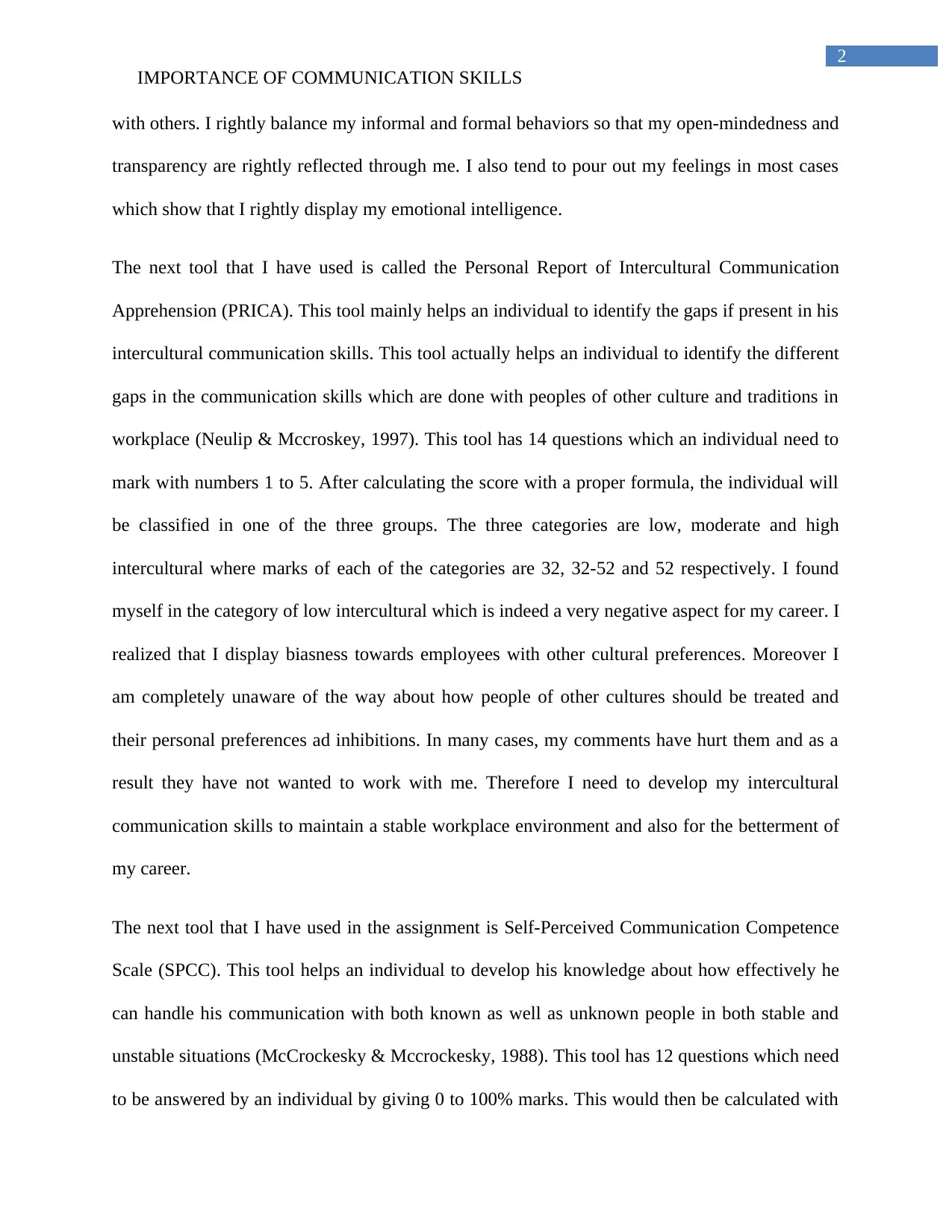
2
IMPORTANCE OF COMMUNICATION SKILLS
with others. I rightly balance my informal and formal behaviors so that my open-mindedness and
transparency are rightly reflected through me. I also tend to pour out my feelings in most cases
which show that I rightly display my emotional intelligence.
The next tool that I have used is called the Personal Report of Intercultural Communication
Apprehension (PRICA). This tool mainly helps an individual to identify the gaps if present in his
intercultural communication skills. This tool actually helps an individual to identify the different
gaps in the communication skills which are done with peoples of other culture and traditions in
workplace (Neulip & Mccroskey, 1997). This tool has 14 questions which an individual need to
mark with numbers 1 to 5. After calculating the score with a proper formula, the individual will
be classified in one of the three groups. The three categories are low, moderate and high
intercultural where marks of each of the categories are 32, 32-52 and 52 respectively. I found
myself in the category of low intercultural which is indeed a very negative aspect for my career. I
realized that I display biasness towards employees with other cultural preferences. Moreover I
am completely unaware of the way about how people of other cultures should be treated and
their personal preferences ad inhibitions. In many cases, my comments have hurt them and as a
result they have not wanted to work with me. Therefore I need to develop my intercultural
communication skills to maintain a stable workplace environment and also for the betterment of
my career.
The next tool that I have used in the assignment is Self-Perceived Communication Competence
Scale (SPCC). This tool helps an individual to develop his knowledge about how effectively he
can handle his communication with both known as well as unknown people in both stable and
unstable situations (McCrockesky & Mccrockesky, 1988). This tool has 12 questions which need
to be answered by an individual by giving 0 to 100% marks. This would then be calculated with
IMPORTANCE OF COMMUNICATION SKILLS
with others. I rightly balance my informal and formal behaviors so that my open-mindedness and
transparency are rightly reflected through me. I also tend to pour out my feelings in most cases
which show that I rightly display my emotional intelligence.
The next tool that I have used is called the Personal Report of Intercultural Communication
Apprehension (PRICA). This tool mainly helps an individual to identify the gaps if present in his
intercultural communication skills. This tool actually helps an individual to identify the different
gaps in the communication skills which are done with peoples of other culture and traditions in
workplace (Neulip & Mccroskey, 1997). This tool has 14 questions which an individual need to
mark with numbers 1 to 5. After calculating the score with a proper formula, the individual will
be classified in one of the three groups. The three categories are low, moderate and high
intercultural where marks of each of the categories are 32, 32-52 and 52 respectively. I found
myself in the category of low intercultural which is indeed a very negative aspect for my career. I
realized that I display biasness towards employees with other cultural preferences. Moreover I
am completely unaware of the way about how people of other cultures should be treated and
their personal preferences ad inhibitions. In many cases, my comments have hurt them and as a
result they have not wanted to work with me. Therefore I need to develop my intercultural
communication skills to maintain a stable workplace environment and also for the betterment of
my career.
The next tool that I have used in the assignment is Self-Perceived Communication Competence
Scale (SPCC). This tool helps an individual to develop his knowledge about how effectively he
can handle his communication with both known as well as unknown people in both stable and
unstable situations (McCrockesky & Mccrockesky, 1988). This tool has 12 questions which need
to be answered by an individual by giving 0 to 100% marks. This would then be calculated with
⊘ This is a preview!⊘
Do you want full access?
Subscribe today to unlock all pages.

Trusted by 1+ million students worldwide
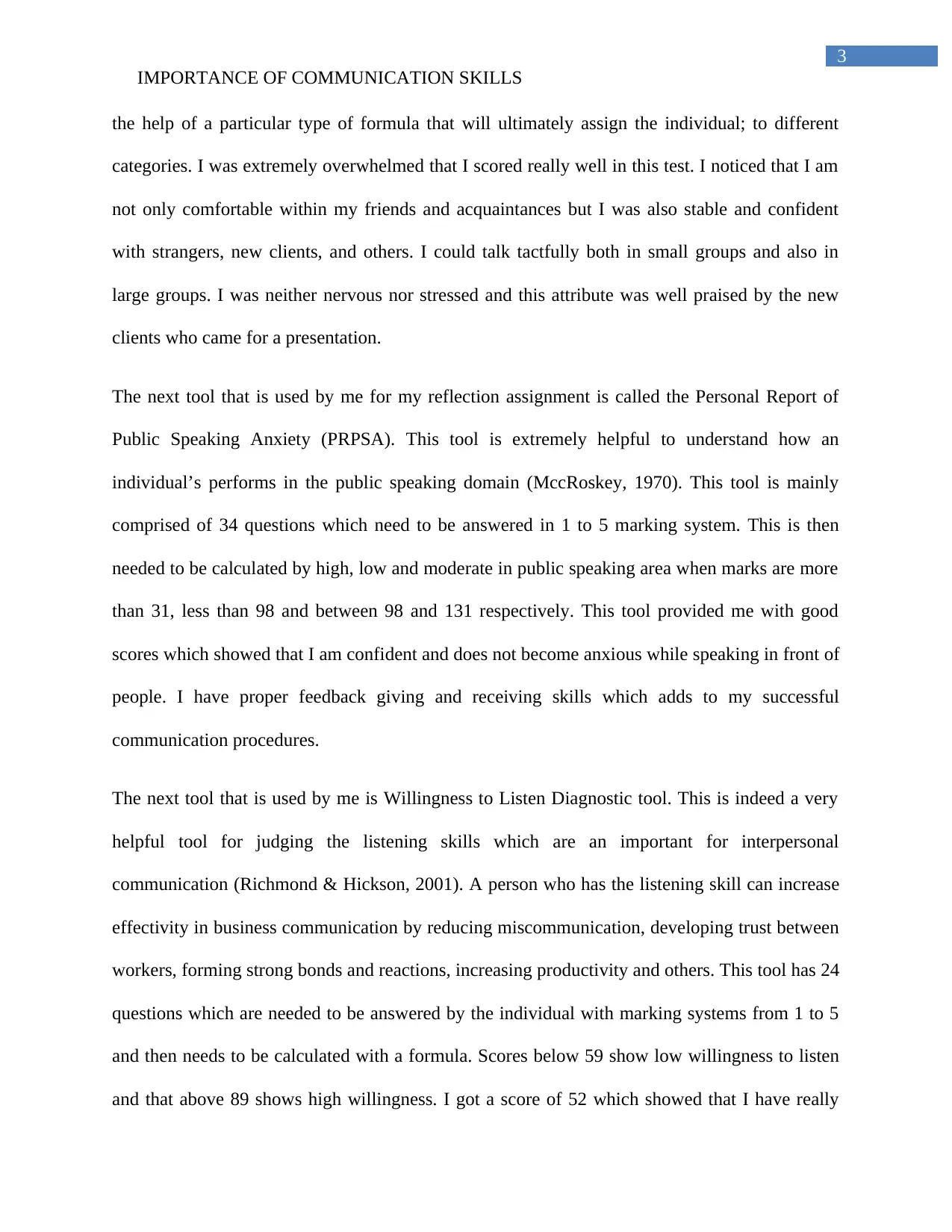
3
IMPORTANCE OF COMMUNICATION SKILLS
the help of a particular type of formula that will ultimately assign the individual; to different
categories. I was extremely overwhelmed that I scored really well in this test. I noticed that I am
not only comfortable within my friends and acquaintances but I was also stable and confident
with strangers, new clients, and others. I could talk tactfully both in small groups and also in
large groups. I was neither nervous nor stressed and this attribute was well praised by the new
clients who came for a presentation.
The next tool that is used by me for my reflection assignment is called the Personal Report of
Public Speaking Anxiety (PRPSA). This tool is extremely helpful to understand how an
individual’s performs in the public speaking domain (MccRoskey, 1970). This tool is mainly
comprised of 34 questions which need to be answered in 1 to 5 marking system. This is then
needed to be calculated by high, low and moderate in public speaking area when marks are more
than 31, less than 98 and between 98 and 131 respectively. This tool provided me with good
scores which showed that I am confident and does not become anxious while speaking in front of
people. I have proper feedback giving and receiving skills which adds to my successful
communication procedures.
The next tool that is used by me is Willingness to Listen Diagnostic tool. This is indeed a very
helpful tool for judging the listening skills which are an important for interpersonal
communication (Richmond & Hickson, 2001). A person who has the listening skill can increase
effectivity in business communication by reducing miscommunication, developing trust between
workers, forming strong bonds and reactions, increasing productivity and others. This tool has 24
questions which are needed to be answered by the individual with marking systems from 1 to 5
and then needs to be calculated with a formula. Scores below 59 show low willingness to listen
and that above 89 shows high willingness. I got a score of 52 which showed that I have really
IMPORTANCE OF COMMUNICATION SKILLS
the help of a particular type of formula that will ultimately assign the individual; to different
categories. I was extremely overwhelmed that I scored really well in this test. I noticed that I am
not only comfortable within my friends and acquaintances but I was also stable and confident
with strangers, new clients, and others. I could talk tactfully both in small groups and also in
large groups. I was neither nervous nor stressed and this attribute was well praised by the new
clients who came for a presentation.
The next tool that is used by me for my reflection assignment is called the Personal Report of
Public Speaking Anxiety (PRPSA). This tool is extremely helpful to understand how an
individual’s performs in the public speaking domain (MccRoskey, 1970). This tool is mainly
comprised of 34 questions which need to be answered in 1 to 5 marking system. This is then
needed to be calculated by high, low and moderate in public speaking area when marks are more
than 31, less than 98 and between 98 and 131 respectively. This tool provided me with good
scores which showed that I am confident and does not become anxious while speaking in front of
people. I have proper feedback giving and receiving skills which adds to my successful
communication procedures.
The next tool that is used by me is Willingness to Listen Diagnostic tool. This is indeed a very
helpful tool for judging the listening skills which are an important for interpersonal
communication (Richmond & Hickson, 2001). A person who has the listening skill can increase
effectivity in business communication by reducing miscommunication, developing trust between
workers, forming strong bonds and reactions, increasing productivity and others. This tool has 24
questions which are needed to be answered by the individual with marking systems from 1 to 5
and then needs to be calculated with a formula. Scores below 59 show low willingness to listen
and that above 89 shows high willingness. I got a score of 52 which showed that I have really
Paraphrase This Document
Need a fresh take? Get an instant paraphrase of this document with our AI Paraphraser
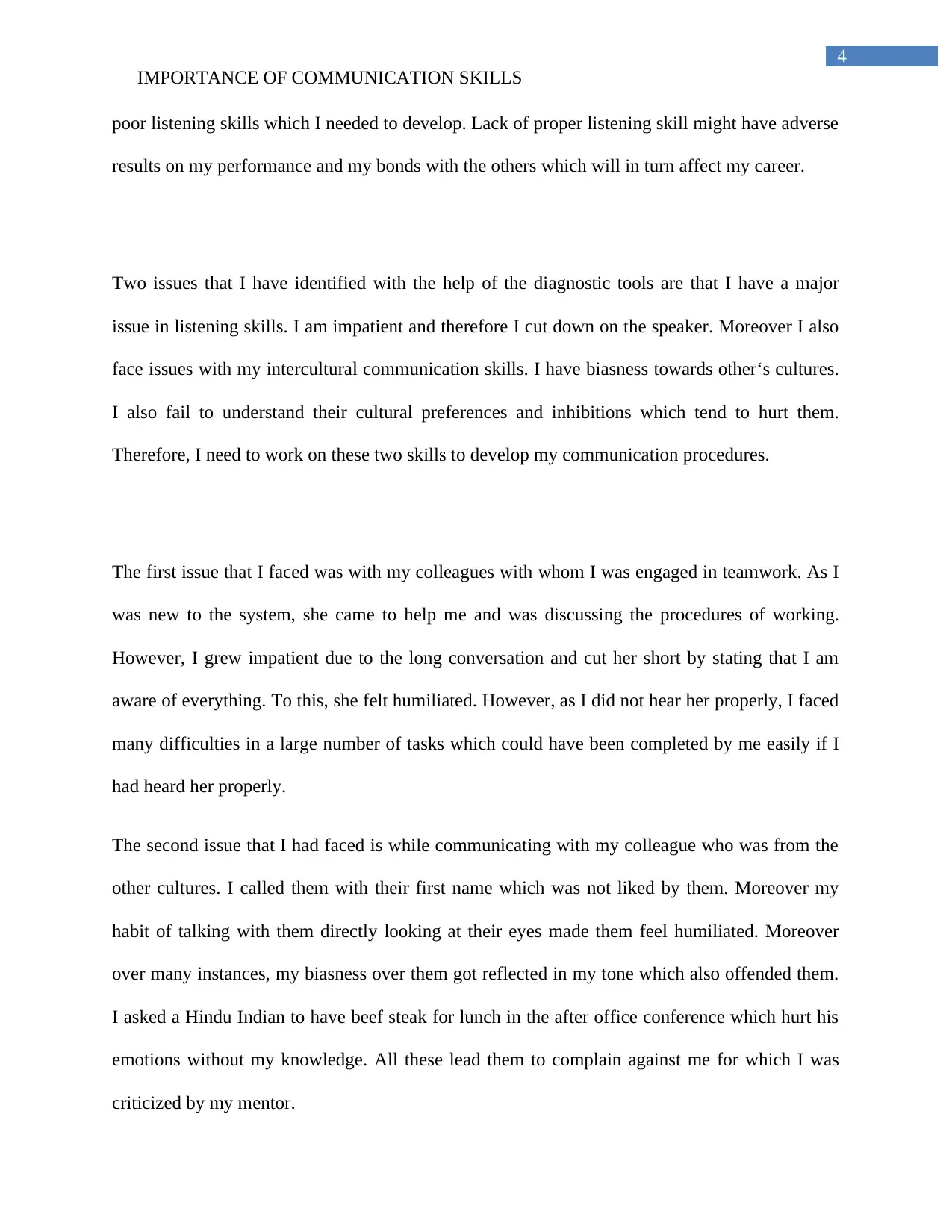
4
IMPORTANCE OF COMMUNICATION SKILLS
poor listening skills which I needed to develop. Lack of proper listening skill might have adverse
results on my performance and my bonds with the others which will in turn affect my career.
Two issues that I have identified with the help of the diagnostic tools are that I have a major
issue in listening skills. I am impatient and therefore I cut down on the speaker. Moreover I also
face issues with my intercultural communication skills. I have biasness towards other‘s cultures.
I also fail to understand their cultural preferences and inhibitions which tend to hurt them.
Therefore, I need to work on these two skills to develop my communication procedures.
The first issue that I faced was with my colleagues with whom I was engaged in teamwork. As I
was new to the system, she came to help me and was discussing the procedures of working.
However, I grew impatient due to the long conversation and cut her short by stating that I am
aware of everything. To this, she felt humiliated. However, as I did not hear her properly, I faced
many difficulties in a large number of tasks which could have been completed by me easily if I
had heard her properly.
The second issue that I had faced is while communicating with my colleague who was from the
other cultures. I called them with their first name which was not liked by them. Moreover my
habit of talking with them directly looking at their eyes made them feel humiliated. Moreover
over many instances, my biasness over them got reflected in my tone which also offended them.
I asked a Hindu Indian to have beef steak for lunch in the after office conference which hurt his
emotions without my knowledge. All these lead them to complain against me for which I was
criticized by my mentor.
IMPORTANCE OF COMMUNICATION SKILLS
poor listening skills which I needed to develop. Lack of proper listening skill might have adverse
results on my performance and my bonds with the others which will in turn affect my career.
Two issues that I have identified with the help of the diagnostic tools are that I have a major
issue in listening skills. I am impatient and therefore I cut down on the speaker. Moreover I also
face issues with my intercultural communication skills. I have biasness towards other‘s cultures.
I also fail to understand their cultural preferences and inhibitions which tend to hurt them.
Therefore, I need to work on these two skills to develop my communication procedures.
The first issue that I faced was with my colleagues with whom I was engaged in teamwork. As I
was new to the system, she came to help me and was discussing the procedures of working.
However, I grew impatient due to the long conversation and cut her short by stating that I am
aware of everything. To this, she felt humiliated. However, as I did not hear her properly, I faced
many difficulties in a large number of tasks which could have been completed by me easily if I
had heard her properly.
The second issue that I had faced is while communicating with my colleague who was from the
other cultures. I called them with their first name which was not liked by them. Moreover my
habit of talking with them directly looking at their eyes made them feel humiliated. Moreover
over many instances, my biasness over them got reflected in my tone which also offended them.
I asked a Hindu Indian to have beef steak for lunch in the after office conference which hurt his
emotions without my knowledge. All these lead them to complain against me for which I was
criticized by my mentor.
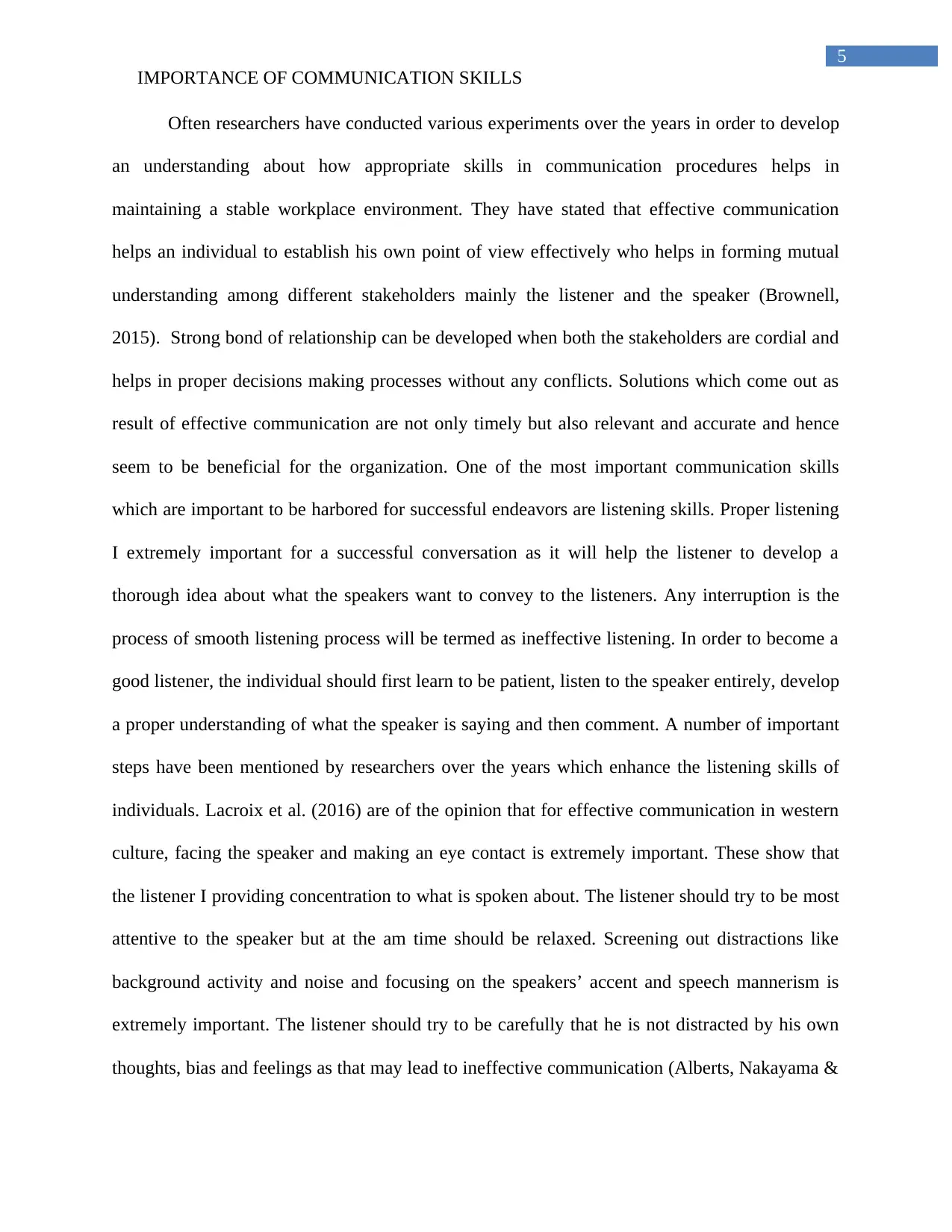
5
IMPORTANCE OF COMMUNICATION SKILLS
Often researchers have conducted various experiments over the years in order to develop
an understanding about how appropriate skills in communication procedures helps in
maintaining a stable workplace environment. They have stated that effective communication
helps an individual to establish his own point of view effectively who helps in forming mutual
understanding among different stakeholders mainly the listener and the speaker (Brownell,
2015). Strong bond of relationship can be developed when both the stakeholders are cordial and
helps in proper decisions making processes without any conflicts. Solutions which come out as
result of effective communication are not only timely but also relevant and accurate and hence
seem to be beneficial for the organization. One of the most important communication skills
which are important to be harbored for successful endeavors are listening skills. Proper listening
I extremely important for a successful conversation as it will help the listener to develop a
thorough idea about what the speakers want to convey to the listeners. Any interruption is the
process of smooth listening process will be termed as ineffective listening. In order to become a
good listener, the individual should first learn to be patient, listen to the speaker entirely, develop
a proper understanding of what the speaker is saying and then comment. A number of important
steps have been mentioned by researchers over the years which enhance the listening skills of
individuals. Lacroix et al. (2016) are of the opinion that for effective communication in western
culture, facing the speaker and making an eye contact is extremely important. These show that
the listener I providing concentration to what is spoken about. The listener should try to be most
attentive to the speaker but at the am time should be relaxed. Screening out distractions like
background activity and noise and focusing on the speakers’ accent and speech mannerism is
extremely important. The listener should try to be carefully that he is not distracted by his own
thoughts, bias and feelings as that may lead to ineffective communication (Alberts, Nakayama &
IMPORTANCE OF COMMUNICATION SKILLS
Often researchers have conducted various experiments over the years in order to develop
an understanding about how appropriate skills in communication procedures helps in
maintaining a stable workplace environment. They have stated that effective communication
helps an individual to establish his own point of view effectively who helps in forming mutual
understanding among different stakeholders mainly the listener and the speaker (Brownell,
2015). Strong bond of relationship can be developed when both the stakeholders are cordial and
helps in proper decisions making processes without any conflicts. Solutions which come out as
result of effective communication are not only timely but also relevant and accurate and hence
seem to be beneficial for the organization. One of the most important communication skills
which are important to be harbored for successful endeavors are listening skills. Proper listening
I extremely important for a successful conversation as it will help the listener to develop a
thorough idea about what the speakers want to convey to the listeners. Any interruption is the
process of smooth listening process will be termed as ineffective listening. In order to become a
good listener, the individual should first learn to be patient, listen to the speaker entirely, develop
a proper understanding of what the speaker is saying and then comment. A number of important
steps have been mentioned by researchers over the years which enhance the listening skills of
individuals. Lacroix et al. (2016) are of the opinion that for effective communication in western
culture, facing the speaker and making an eye contact is extremely important. These show that
the listener I providing concentration to what is spoken about. The listener should try to be most
attentive to the speaker but at the am time should be relaxed. Screening out distractions like
background activity and noise and focusing on the speakers’ accent and speech mannerism is
extremely important. The listener should try to be carefully that he is not distracted by his own
thoughts, bias and feelings as that may lead to ineffective communication (Alberts, Nakayama &
⊘ This is a preview!⊘
Do you want full access?
Subscribe today to unlock all pages.

Trusted by 1+ million students worldwide
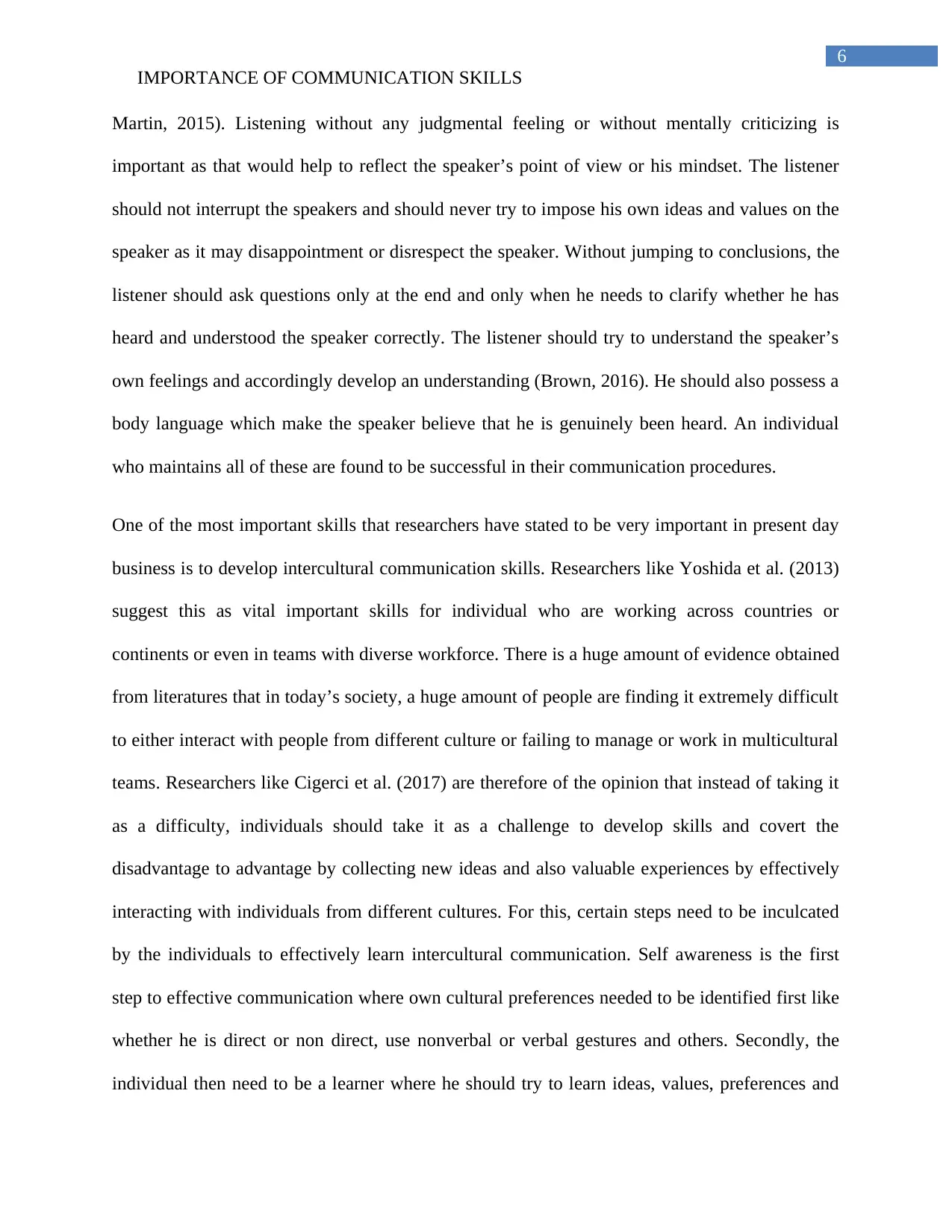
6
IMPORTANCE OF COMMUNICATION SKILLS
Martin, 2015). Listening without any judgmental feeling or without mentally criticizing is
important as that would help to reflect the speaker’s point of view or his mindset. The listener
should not interrupt the speakers and should never try to impose his own ideas and values on the
speaker as it may disappointment or disrespect the speaker. Without jumping to conclusions, the
listener should ask questions only at the end and only when he needs to clarify whether he has
heard and understood the speaker correctly. The listener should try to understand the speaker’s
own feelings and accordingly develop an understanding (Brown, 2016). He should also possess a
body language which make the speaker believe that he is genuinely been heard. An individual
who maintains all of these are found to be successful in their communication procedures.
One of the most important skills that researchers have stated to be very important in present day
business is to develop intercultural communication skills. Researchers like Yoshida et al. (2013)
suggest this as vital important skills for individual who are working across countries or
continents or even in teams with diverse workforce. There is a huge amount of evidence obtained
from literatures that in today’s society, a huge amount of people are finding it extremely difficult
to either interact with people from different culture or failing to manage or work in multicultural
teams. Researchers like Cigerci et al. (2017) are therefore of the opinion that instead of taking it
as a difficulty, individuals should take it as a challenge to develop skills and covert the
disadvantage to advantage by collecting new ideas and also valuable experiences by effectively
interacting with individuals from different cultures. For this, certain steps need to be inculcated
by the individuals to effectively learn intercultural communication. Self awareness is the first
step to effective communication where own cultural preferences needed to be identified first like
whether he is direct or non direct, use nonverbal or verbal gestures and others. Secondly, the
individual then need to be a learner where he should try to learn ideas, values, preferences and
IMPORTANCE OF COMMUNICATION SKILLS
Martin, 2015). Listening without any judgmental feeling or without mentally criticizing is
important as that would help to reflect the speaker’s point of view or his mindset. The listener
should not interrupt the speakers and should never try to impose his own ideas and values on the
speaker as it may disappointment or disrespect the speaker. Without jumping to conclusions, the
listener should ask questions only at the end and only when he needs to clarify whether he has
heard and understood the speaker correctly. The listener should try to understand the speaker’s
own feelings and accordingly develop an understanding (Brown, 2016). He should also possess a
body language which make the speaker believe that he is genuinely been heard. An individual
who maintains all of these are found to be successful in their communication procedures.
One of the most important skills that researchers have stated to be very important in present day
business is to develop intercultural communication skills. Researchers like Yoshida et al. (2013)
suggest this as vital important skills for individual who are working across countries or
continents or even in teams with diverse workforce. There is a huge amount of evidence obtained
from literatures that in today’s society, a huge amount of people are finding it extremely difficult
to either interact with people from different culture or failing to manage or work in multicultural
teams. Researchers like Cigerci et al. (2017) are therefore of the opinion that instead of taking it
as a difficulty, individuals should take it as a challenge to develop skills and covert the
disadvantage to advantage by collecting new ideas and also valuable experiences by effectively
interacting with individuals from different cultures. For this, certain steps need to be inculcated
by the individuals to effectively learn intercultural communication. Self awareness is the first
step to effective communication where own cultural preferences needed to be identified first like
whether he is direct or non direct, use nonverbal or verbal gestures and others. Secondly, the
individual then need to be a learner where he should try to learn ideas, values, preferences and
Paraphrase This Document
Need a fresh take? Get an instant paraphrase of this document with our AI Paraphraser
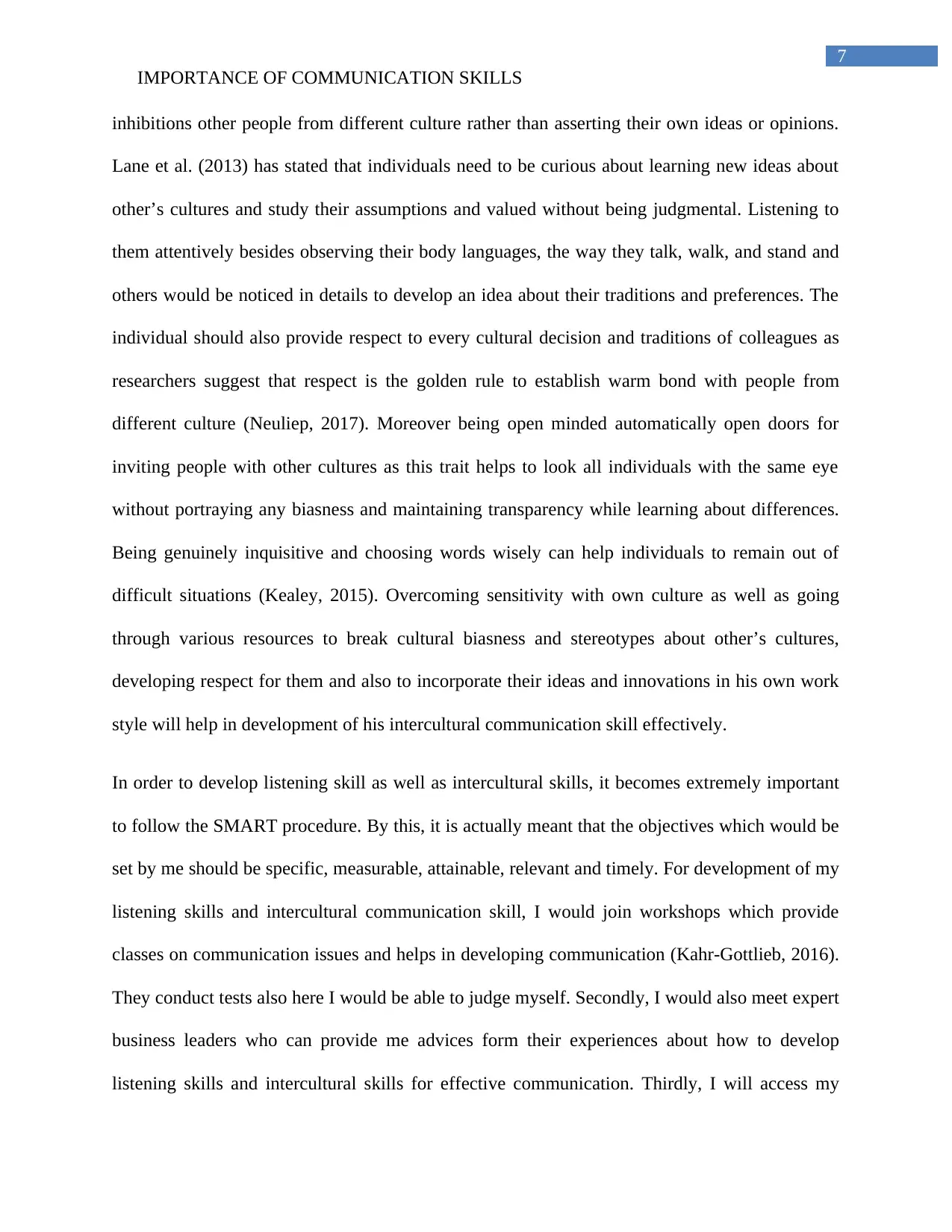
7
IMPORTANCE OF COMMUNICATION SKILLS
inhibitions other people from different culture rather than asserting their own ideas or opinions.
Lane et al. (2013) has stated that individuals need to be curious about learning new ideas about
other’s cultures and study their assumptions and valued without being judgmental. Listening to
them attentively besides observing their body languages, the way they talk, walk, and stand and
others would be noticed in details to develop an idea about their traditions and preferences. The
individual should also provide respect to every cultural decision and traditions of colleagues as
researchers suggest that respect is the golden rule to establish warm bond with people from
different culture (Neuliep, 2017). Moreover being open minded automatically open doors for
inviting people with other cultures as this trait helps to look all individuals with the same eye
without portraying any biasness and maintaining transparency while learning about differences.
Being genuinely inquisitive and choosing words wisely can help individuals to remain out of
difficult situations (Kealey, 2015). Overcoming sensitivity with own culture as well as going
through various resources to break cultural biasness and stereotypes about other’s cultures,
developing respect for them and also to incorporate their ideas and innovations in his own work
style will help in development of his intercultural communication skill effectively.
In order to develop listening skill as well as intercultural skills, it becomes extremely important
to follow the SMART procedure. By this, it is actually meant that the objectives which would be
set by me should be specific, measurable, attainable, relevant and timely. For development of my
listening skills and intercultural communication skill, I would join workshops which provide
classes on communication issues and helps in developing communication (Kahr-Gottlieb, 2016).
They conduct tests also here I would be able to judge myself. Secondly, I would also meet expert
business leaders who can provide me advices form their experiences about how to develop
listening skills and intercultural skills for effective communication. Thirdly, I will access my
IMPORTANCE OF COMMUNICATION SKILLS
inhibitions other people from different culture rather than asserting their own ideas or opinions.
Lane et al. (2013) has stated that individuals need to be curious about learning new ideas about
other’s cultures and study their assumptions and valued without being judgmental. Listening to
them attentively besides observing their body languages, the way they talk, walk, and stand and
others would be noticed in details to develop an idea about their traditions and preferences. The
individual should also provide respect to every cultural decision and traditions of colleagues as
researchers suggest that respect is the golden rule to establish warm bond with people from
different culture (Neuliep, 2017). Moreover being open minded automatically open doors for
inviting people with other cultures as this trait helps to look all individuals with the same eye
without portraying any biasness and maintaining transparency while learning about differences.
Being genuinely inquisitive and choosing words wisely can help individuals to remain out of
difficult situations (Kealey, 2015). Overcoming sensitivity with own culture as well as going
through various resources to break cultural biasness and stereotypes about other’s cultures,
developing respect for them and also to incorporate their ideas and innovations in his own work
style will help in development of his intercultural communication skill effectively.
In order to develop listening skill as well as intercultural skills, it becomes extremely important
to follow the SMART procedure. By this, it is actually meant that the objectives which would be
set by me should be specific, measurable, attainable, relevant and timely. For development of my
listening skills and intercultural communication skill, I would join workshops which provide
classes on communication issues and helps in developing communication (Kahr-Gottlieb, 2016).
They conduct tests also here I would be able to judge myself. Secondly, I would also meet expert
business leaders who can provide me advices form their experiences about how to develop
listening skills and intercultural skills for effective communication. Thirdly, I will access my
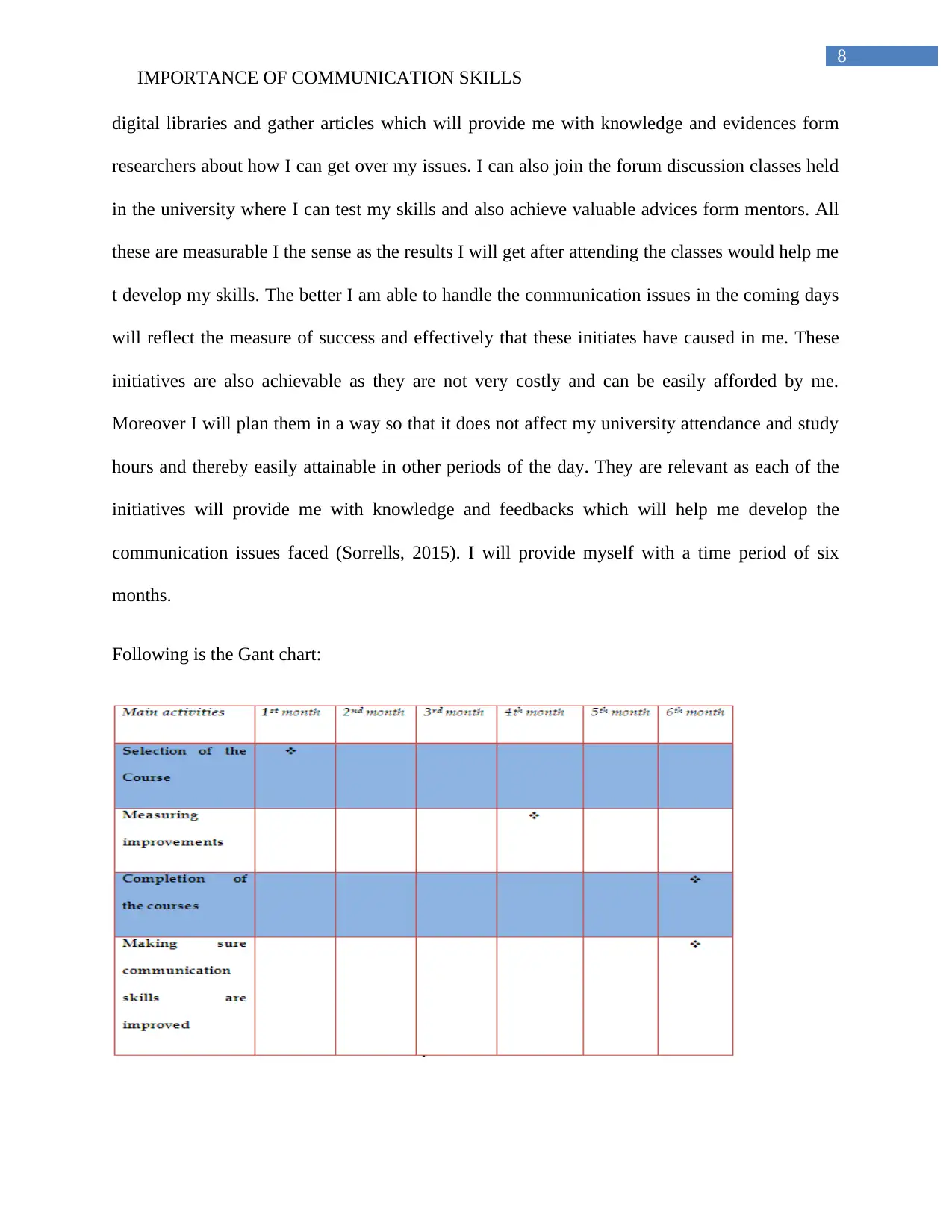
8
IMPORTANCE OF COMMUNICATION SKILLS
digital libraries and gather articles which will provide me with knowledge and evidences form
researchers about how I can get over my issues. I can also join the forum discussion classes held
in the university where I can test my skills and also achieve valuable advices form mentors. All
these are measurable I the sense as the results I will get after attending the classes would help me
t develop my skills. The better I am able to handle the communication issues in the coming days
will reflect the measure of success and effectively that these initiates have caused in me. These
initiatives are also achievable as they are not very costly and can be easily afforded by me.
Moreover I will plan them in a way so that it does not affect my university attendance and study
hours and thereby easily attainable in other periods of the day. They are relevant as each of the
initiatives will provide me with knowledge and feedbacks which will help me develop the
communication issues faced (Sorrells, 2015). I will provide myself with a time period of six
months.
Following is the Gant chart:
IMPORTANCE OF COMMUNICATION SKILLS
digital libraries and gather articles which will provide me with knowledge and evidences form
researchers about how I can get over my issues. I can also join the forum discussion classes held
in the university where I can test my skills and also achieve valuable advices form mentors. All
these are measurable I the sense as the results I will get after attending the classes would help me
t develop my skills. The better I am able to handle the communication issues in the coming days
will reflect the measure of success and effectively that these initiates have caused in me. These
initiatives are also achievable as they are not very costly and can be easily afforded by me.
Moreover I will plan them in a way so that it does not affect my university attendance and study
hours and thereby easily attainable in other periods of the day. They are relevant as each of the
initiatives will provide me with knowledge and feedbacks which will help me develop the
communication issues faced (Sorrells, 2015). I will provide myself with a time period of six
months.
Following is the Gant chart:
⊘ This is a preview!⊘
Do you want full access?
Subscribe today to unlock all pages.

Trusted by 1+ million students worldwide
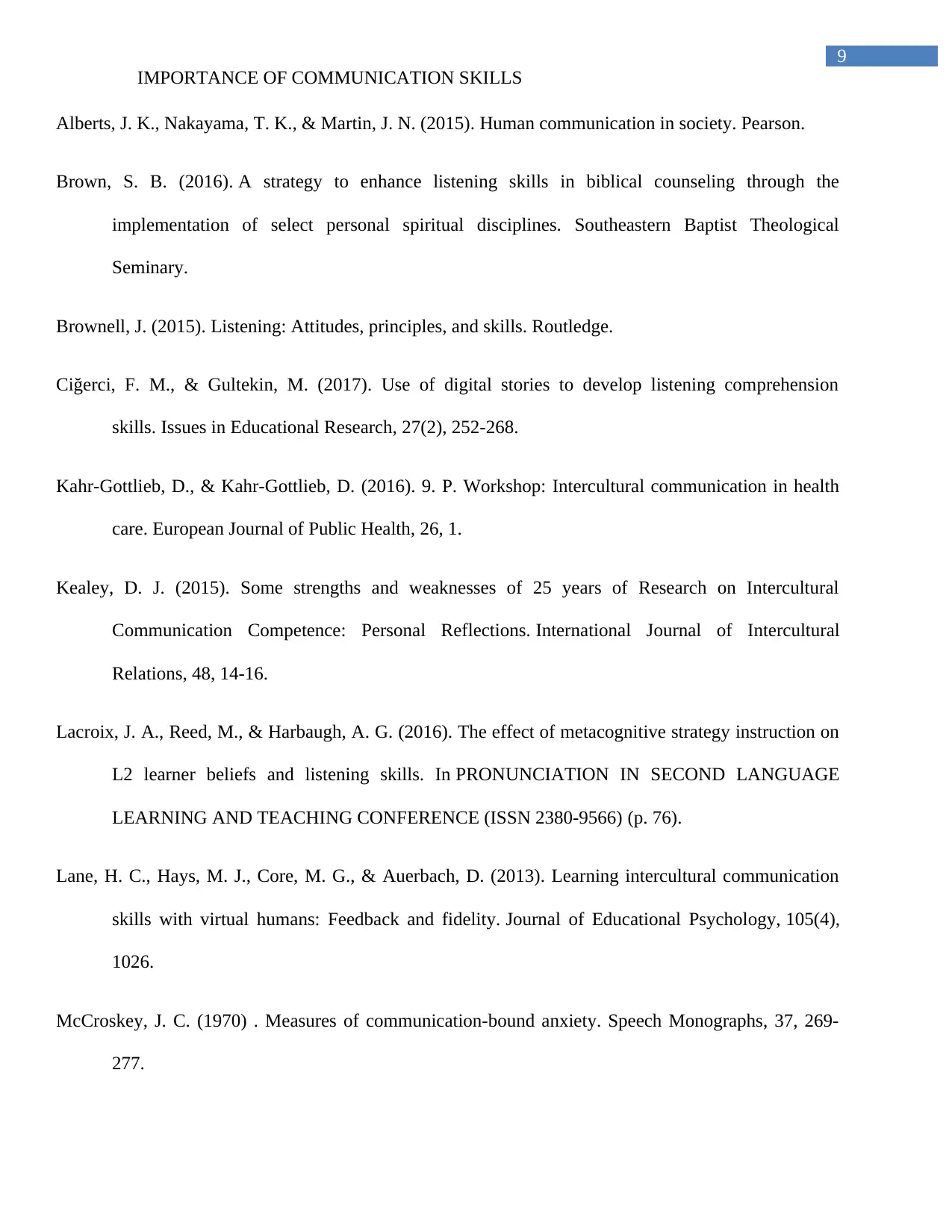
9
IMPORTANCE OF COMMUNICATION SKILLS
Alberts, J. K., Nakayama, T. K., & Martin, J. N. (2015). Human communication in society. Pearson.
Brown, S. B. (2016). A strategy to enhance listening skills in biblical counseling through the
implementation of select personal spiritual disciplines. Southeastern Baptist Theological
Seminary.
Brownell, J. (2015). Listening: Attitudes, principles, and skills. Routledge.
Ciğerci, F. M., & Gultekin, M. (2017). Use of digital stories to develop listening comprehension
skills. Issues in Educational Research, 27(2), 252-268.
Kahr-Gottlieb, D., & Kahr-Gottlieb, D. (2016). 9. P. Workshop: Intercultural communication in health
care. European Journal of Public Health, 26, 1.
Kealey, D. J. (2015). Some strengths and weaknesses of 25 years of Research on Intercultural
Communication Competence: Personal Reflections. International Journal of Intercultural
Relations, 48, 14-16.
Lacroix, J. A., Reed, M., & Harbaugh, A. G. (2016). The effect of metacognitive strategy instruction on
L2 learner beliefs and listening skills. In PRONUNCIATION IN SECOND LANGUAGE
LEARNING AND TEACHING CONFERENCE (ISSN 2380-9566) (p. 76).
Lane, H. C., Hays, M. J., Core, M. G., & Auerbach, D. (2013). Learning intercultural communication
skills with virtual humans: Feedback and fidelity. Journal of Educational Psychology, 105(4),
1026.
McCroskey, J. C. (1970) . Measures of communication-bound anxiety. Speech Monographs, 37, 269-
277.
IMPORTANCE OF COMMUNICATION SKILLS
Alberts, J. K., Nakayama, T. K., & Martin, J. N. (2015). Human communication in society. Pearson.
Brown, S. B. (2016). A strategy to enhance listening skills in biblical counseling through the
implementation of select personal spiritual disciplines. Southeastern Baptist Theological
Seminary.
Brownell, J. (2015). Listening: Attitudes, principles, and skills. Routledge.
Ciğerci, F. M., & Gultekin, M. (2017). Use of digital stories to develop listening comprehension
skills. Issues in Educational Research, 27(2), 252-268.
Kahr-Gottlieb, D., & Kahr-Gottlieb, D. (2016). 9. P. Workshop: Intercultural communication in health
care. European Journal of Public Health, 26, 1.
Kealey, D. J. (2015). Some strengths and weaknesses of 25 years of Research on Intercultural
Communication Competence: Personal Reflections. International Journal of Intercultural
Relations, 48, 14-16.
Lacroix, J. A., Reed, M., & Harbaugh, A. G. (2016). The effect of metacognitive strategy instruction on
L2 learner beliefs and listening skills. In PRONUNCIATION IN SECOND LANGUAGE
LEARNING AND TEACHING CONFERENCE (ISSN 2380-9566) (p. 76).
Lane, H. C., Hays, M. J., Core, M. G., & Auerbach, D. (2013). Learning intercultural communication
skills with virtual humans: Feedback and fidelity. Journal of Educational Psychology, 105(4),
1026.
McCroskey, J. C. (1970) . Measures of communication-bound anxiety. Speech Monographs, 37, 269-
277.
Paraphrase This Document
Need a fresh take? Get an instant paraphrase of this document with our AI Paraphraser
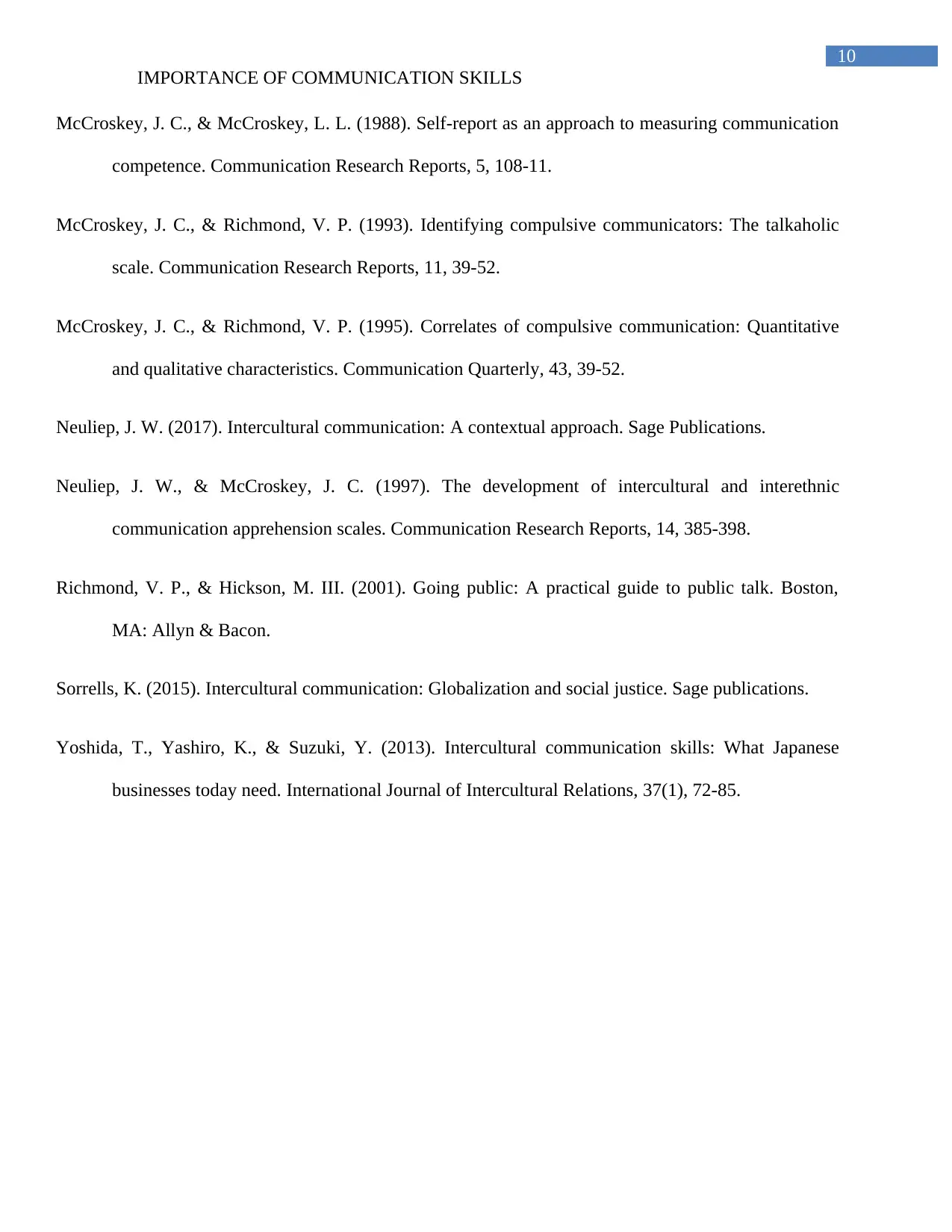
10
IMPORTANCE OF COMMUNICATION SKILLS
McCroskey, J. C., & McCroskey, L. L. (1988). Self-report as an approach to measuring communication
competence. Communication Research Reports, 5, 108-11.
McCroskey, J. C., & Richmond, V. P. (1993). Identifying compulsive communicators: The talkaholic
scale. Communication Research Reports, 11, 39-52.
McCroskey, J. C., & Richmond, V. P. (1995). Correlates of compulsive communication: Quantitative
and qualitative characteristics. Communication Quarterly, 43, 39-52.
Neuliep, J. W. (2017). Intercultural communication: A contextual approach. Sage Publications.
Neuliep, J. W., & McCroskey, J. C. (1997). The development of intercultural and interethnic
communication apprehension scales. Communication Research Reports, 14, 385-398.
Richmond, V. P., & Hickson, M. III. (2001). Going public: A practical guide to public talk. Boston,
MA: Allyn & Bacon.
Sorrells, K. (2015). Intercultural communication: Globalization and social justice. Sage publications.
Yoshida, T., Yashiro, K., & Suzuki, Y. (2013). Intercultural communication skills: What Japanese
businesses today need. International Journal of Intercultural Relations, 37(1), 72-85.
IMPORTANCE OF COMMUNICATION SKILLS
McCroskey, J. C., & McCroskey, L. L. (1988). Self-report as an approach to measuring communication
competence. Communication Research Reports, 5, 108-11.
McCroskey, J. C., & Richmond, V. P. (1993). Identifying compulsive communicators: The talkaholic
scale. Communication Research Reports, 11, 39-52.
McCroskey, J. C., & Richmond, V. P. (1995). Correlates of compulsive communication: Quantitative
and qualitative characteristics. Communication Quarterly, 43, 39-52.
Neuliep, J. W. (2017). Intercultural communication: A contextual approach. Sage Publications.
Neuliep, J. W., & McCroskey, J. C. (1997). The development of intercultural and interethnic
communication apprehension scales. Communication Research Reports, 14, 385-398.
Richmond, V. P., & Hickson, M. III. (2001). Going public: A practical guide to public talk. Boston,
MA: Allyn & Bacon.
Sorrells, K. (2015). Intercultural communication: Globalization and social justice. Sage publications.
Yoshida, T., Yashiro, K., & Suzuki, Y. (2013). Intercultural communication skills: What Japanese
businesses today need. International Journal of Intercultural Relations, 37(1), 72-85.
1 out of 11
Related Documents
Your All-in-One AI-Powered Toolkit for Academic Success.
+13062052269
info@desklib.com
Available 24*7 on WhatsApp / Email
![[object Object]](/_next/static/media/star-bottom.7253800d.svg)
Unlock your academic potential
Copyright © 2020–2026 A2Z Services. All Rights Reserved. Developed and managed by ZUCOL.





